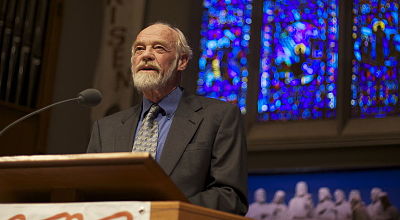Eugene Peterson rarely does interviews. I have heard that he once turned down the opportunity to hang out with Bono—Bono!—because he was busy with a writing deadline. So it’s a huge honor that he agreed to talk with me about the new edition of his Bible translation The Message, which has sold millions of copies worldwide. Today he talks about The Message Study Bible.
Congratulations on this new edition of The Message. How long did the project take you to do?
I did the New Testament first. It took about a year and a half to do the New Testament and the Psalms. I was a writer in residence at Pittsburgh Seminary, and that was all I was doing. Then I went on to be a professor at Regent College and I had classroom work to do, and it took me 10 more years to do the Old Testament. It’s a really long book.
You did this project primarily as a pastor who felt that people weren’t really understanding the Bible–that they needed a translation of the Bible into American vernacular.
I didn’t intend to translate the Bible. It started when I was doing bits and pieces for my congregation. I think maybe it helps to know that I wasn’t planning to be a pastor; I trained to be a professor. When I became a pastor, I was still acting like a professor—explaining everything, telling people about archaeological digs, that sort of thing. After a couple of years I realized that wasn’t working. I started listening to the people in my congregation. Then I learned how to preach by listening to them—changing from a didactic preaching style to something more conversational. In the process of doing that I would translate portions of the Psalms here and there and parts of the Gospels into this style of preaching. The more I did that, the more it affected the way I was preaching. The way I was preaching and the way I was writing kind of came together.
The annotations in the edition you have are mostly from my sermons, and some lectures. But they really are part of the same mindset, the imaginative world I was working in as a pastor.
What makes The Message unique for me, and I think for many readers, is that it recovers a narrative unity that many people have a hard time seeing in the Bible. You treat it as a grand story with hundreds of smaller sub-stories.
I spent several years as a teacher of Hebrew and Greek. So I had the languages pretty well internalized. But also as I was studying the languages and the culture of language, I realized that virtually everything in the Bible originated in the spoken word. It was oral. Writing came second. As I imagined myself in that world, I thought, “This started out as a story.” It didn’t have chapter and verse numbers. None of it was bound in a single volume. People had all this in their heads, and there are connections, allusions, all through the Bible to other parts of the Bible. I was trying to recover what I call a biblical imagination, one that understands and enters into this orality of the original thing. I was very conscious of trying to recover the narrative quality.
What struck you this time around particularly?
I don’t read The Message very much. I did it for my congregation, for people who don’t yet know how to read the Bible. What basically comes to me when I do pick it up is that I’m surprised by what I’ve done. I was trying to be accurate but also conversational. Sometimes I’m just astonished. I’m pleased, to tell you the truth, and I think I had some help along the way.
Were you surprised by the way The Message has been received?
I think the comment that I hear most frequently is, “I’ve been reading the Bible all my life and I never understood it. I didn’t know it was so fresh, so personal and relational.” I think people find it a new experience. And I can understand that.
Every book needs to be retranslated every generation or so. I’ve been rereading some of Dostoevsky’s novels that have been recently retranslated. It just freshens them up. Language changes, and we have to keep finding ways to keep it current—the idioms and metaphors.
Used with permission from Religion News.
See an error in this article?
To contact us or to submit an article























